Can ChatGPT recommend the perfect microwave for your home? Not yet.
Despite AI's leaps, ChatGPT still lacks in one of the internet’s biggest arenas: shopping.
Navigating a web of customer preferences, product options, and ever-evolving trends proves to be a challenge that ChatGPT can’t tackle on its own.
That’s why commerce-fueled search engines like Google and Amazon still rule the world of online shopping.
But can a future of AI-assisted shopping kickstart with the help of ChatGPT’s shiniest new plugins? Let’s examine if a plugin-powered ChatGPT can truly shop or not, and if so —how to do it.
Why ChatGPT doesn’t work well for shopping
ChatGPT isn’t built to shop. Not in its current state.
For starters, it’s simply not designed to complete eCommerce tasks. Its training knowledge cuts off at 2021 and lacks product information, pricing, and specifications. This results in hallucinating product information and limiting browsing capability.
Enter ChatGPT’s plugin store — a promise to expand a finite product to infinite possibilities.
Plugins are downloadable third-party software that allow ChatGPT to access more specific and relevant data beyond its original training.
ChatGPT plugins promise the world to users, but do they deliver?
Limitations of ChatGPT
Most ChatGPT plugins suck.
Many of them just mimic what you could do yourself in an Amazon search, or simply don’t work at all.
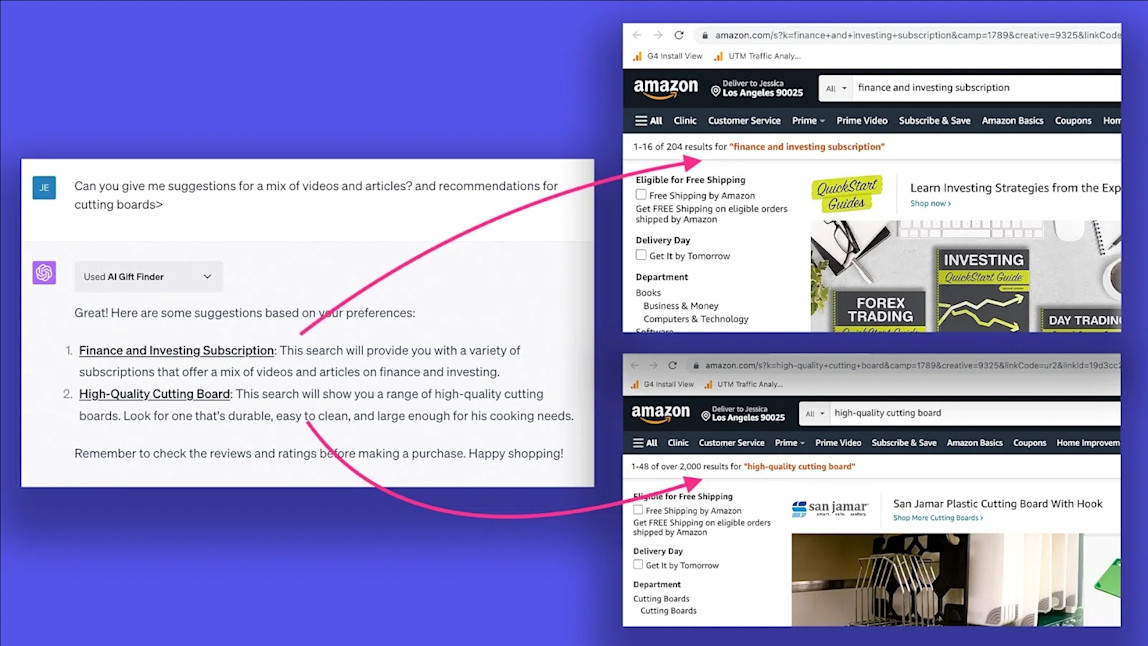
In all honesty, this type of functionality is not more valuable or powerful than a manual search or what ChatGPT can do by itself.
The two biggest technical limitations right now are: limitations of data and limitations of product recognition. Most of these plugins only recognize Amazon products and merchants, and a majority of them perform poorly in product identification (fetching laptop stands when asked for “standing desks”).
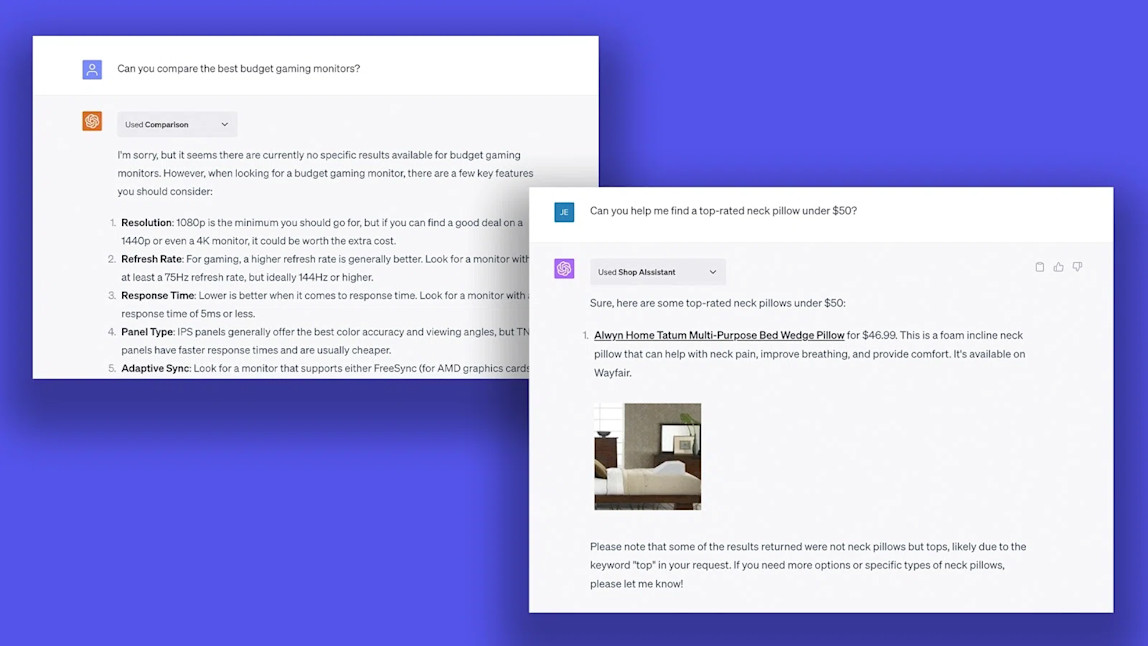
However, a few plugins stand out in actually enhancing the online shopping experience by (1) being straightforward, specific, and pragmatic in function and (2) giving useful and actionable outputs.
The best plugins don’t promise you the world — they just promise to work. To do exactly what you need them to do, then be on your merry way.
Best ChatGPT plugins for online shopping
After testing all plugins related to end-to-end shopping: discovery, browsing, brainstorming, gifting, couponing, product searching, brand searching, checkout, research, and more…I shortlisted four that truly work.
Find out what these plugins can do for shoppers, where they fall short, and if they triumph over traditional online shopping.
Let’s begin!
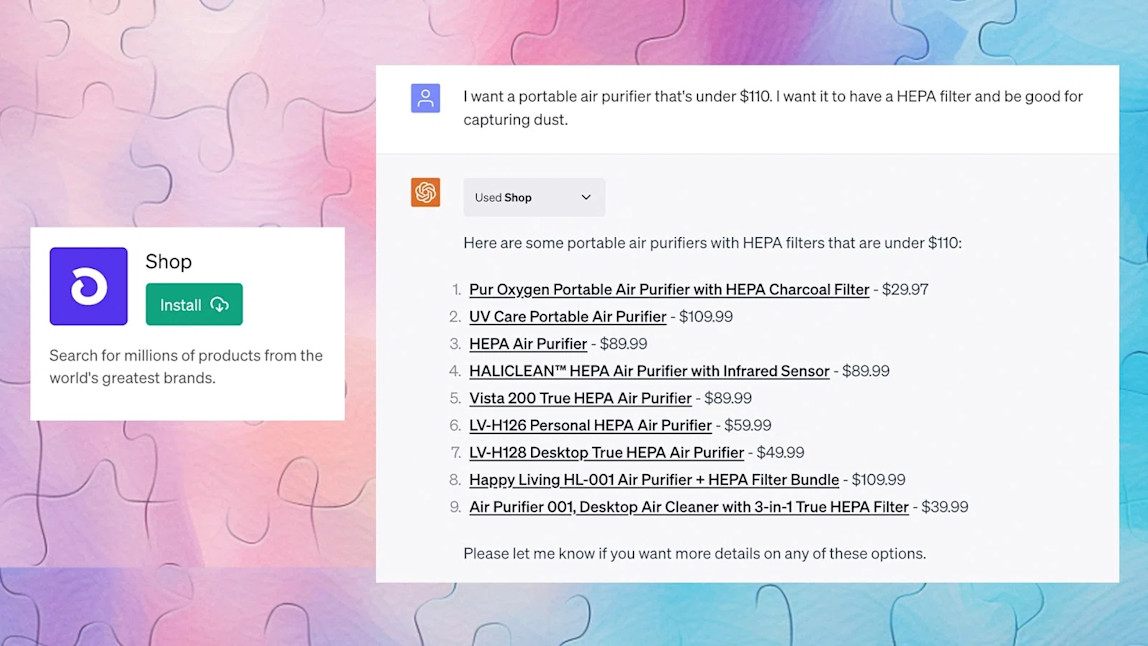
Shop by Shopify: Get product recommendations for anything you ask
With Shop, you can search for products with your chosen qualities (budget, features, brands, etc.) and get a list of linked recommendations.
What it’s for: Product recommendations.
Bottom line**:** It’s a starting place, but not for anything that involves taste or style like clothes — it’s not built as a style recognizer, and it doesn’t provide detailed qualitative explanations for its selection. This is great for appliances with specs that are easily filterable.
Why download? Best product recognition and largest data array outside of Amazon. Outputs are built around user experience rather than affiliate reporting.
Better than Google? Faster, more conclusive shopping journey. But not better for consumer research.
Good for: Fetching products.
Not for: Shopping big brands, fashion and style choices, expensive purchases.
Limitations: Product catalog limited to merchants on the Shopify platform.
How to use: Ask it for product recommendations. It’ll return a list of products, along with prices and links to buy.
Trigger: Mention of shopping, products, “I want to buy…,” “I’m looking for…,” “Where can I get…,” “Please suggest…”
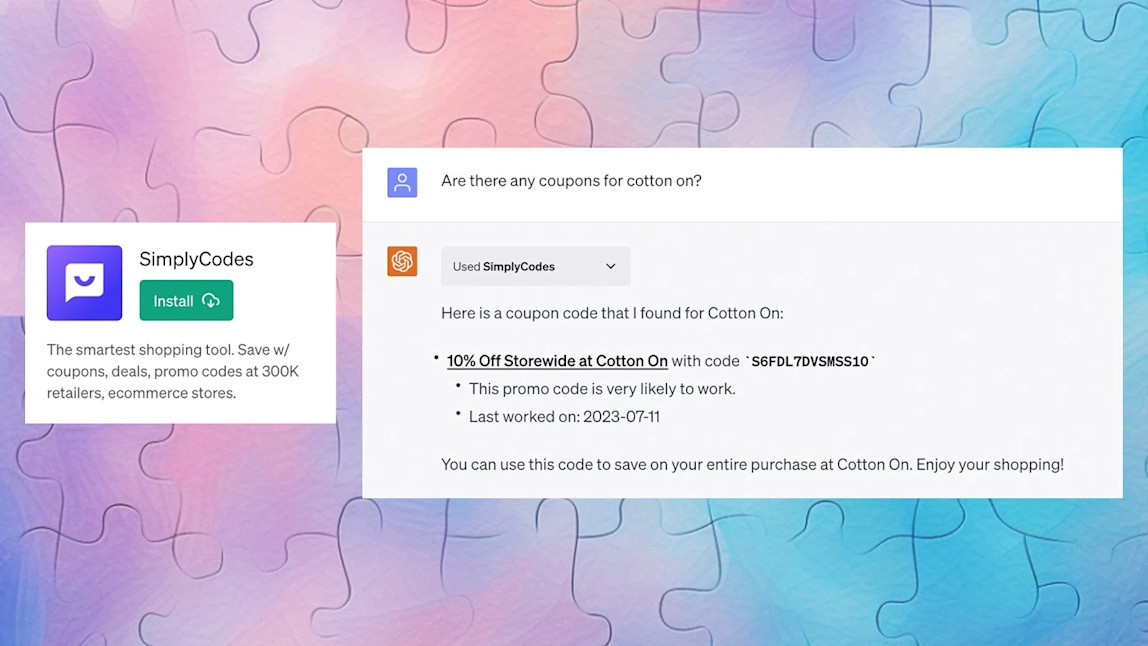
SimplyCodes: Get the coupon, get out (without ads)
We’ve built our own ChatGPT here at SimplyCodes, and compared to existing plugins out there, we’re pretty sure ours does the best job of providing coupons and deals through ChatGPT. SimplyCodes is known for having the biggest coupon database on the web, with 3x more working coupons than the leading coupon tools. With our ChatGPT plugin, you can quickly access this huge database of coupons through a convenient chat interface.
What it’s for: Getting coupons. No pop-up ads. No sketchy sites. Just coupons.
Bottom line: It gives you the coupons you ask for. That’s it. If it finds nothing, that store probably doesn’t have any available.
Why download? It’s really easy to use if you want to save time and skip the guesswork of if there’s any discounts available.
Better than Google? Yes. It skips all the search results filled with annoying ads, fake deals, and hidden codes. It just directly gives you a promo code, if there is one.
Good for: Finding deals.
Not for: Price-matching, broad product discovery (anything outside of finding promo codes).
Limitations: If there’s no known crowdsourced promo code, it can’t conjure up any extra savings or cashback on its own. The coupons are crowdsourced in real time, but may not work due to expiration, item eligibility, or incorrect code submission. It can recognize products, but it's best for store and brand coupons.
How to use: Ask it for discounts at a specific store, or ask it for deals on a category and chat further for suggested retailers.
Trigger: Mention of shopping or saving, “I want to save on…,” “Coupons for…?”
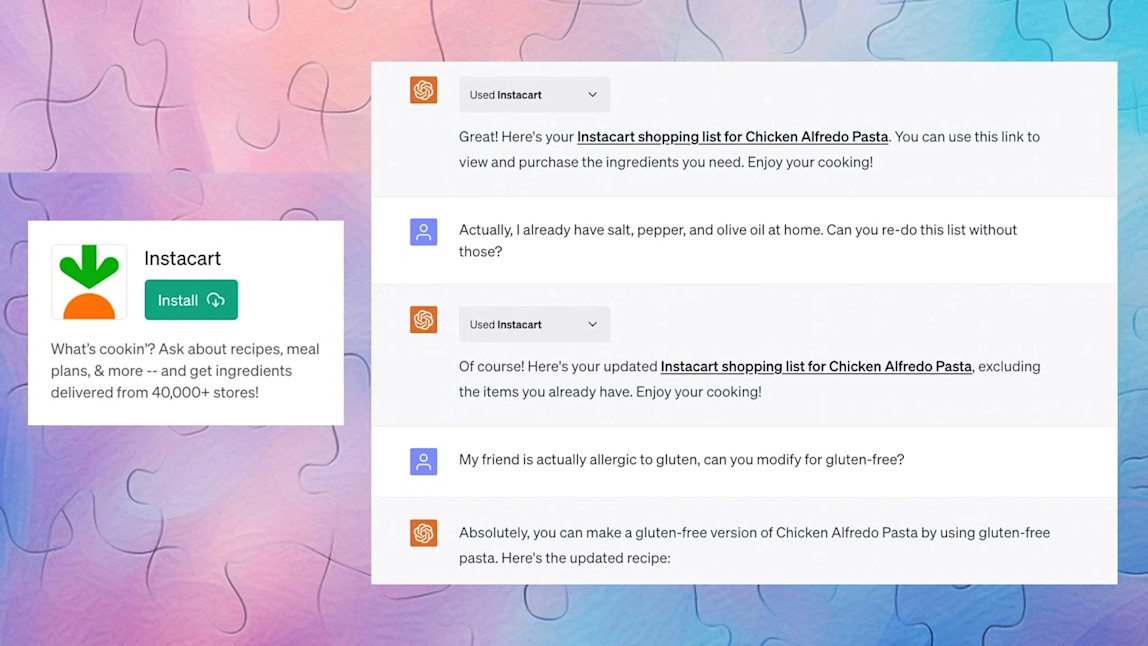
Instacart: True end-to-end meal prep (and snack knowledge!)
Plan a meal from beginning to end and have the ingredients delivered to your home using Instacart’s ChatGPT plugin.
What it’s for: Grocery orders, from brainstorm to delivery.
Bottom line: It’s the easiest grocery shopping you’ll ever do. The externally linked shopping list to Instacart is awesome, automatically adjusting any recipe list to the stock of whichever local grocer you choose to shop.
Why download? It’s everything an effective plugin-to-app journey should do: it replaces what could be a day of work with one brief conversation.
Better than Google? Yes. Grocery shopping should never start on Google. Better than Amazon too.
Good for: Figuring out meal plans and streamlining grocery orders.
Not for: Questions about your specific local grocers (no data for “What’s fresh at Whole Foods today?”).
Limitations: The shoppable list requires you to checkout on Instacart instead of other apps.
How to use: Ask for snack lists and recipe ideas based on what you want to eat, what you have in your fridge, dietary preferences, who you’re cooking for, and get recipes and a link to a shopping list with all the ingredients you need. Follow the link to Instacart to get those ingredients delivered to your door.
Trigger: Mention of cooking, asking for recipes, “What can I cook with…?,” “Ideas for [meal]?”
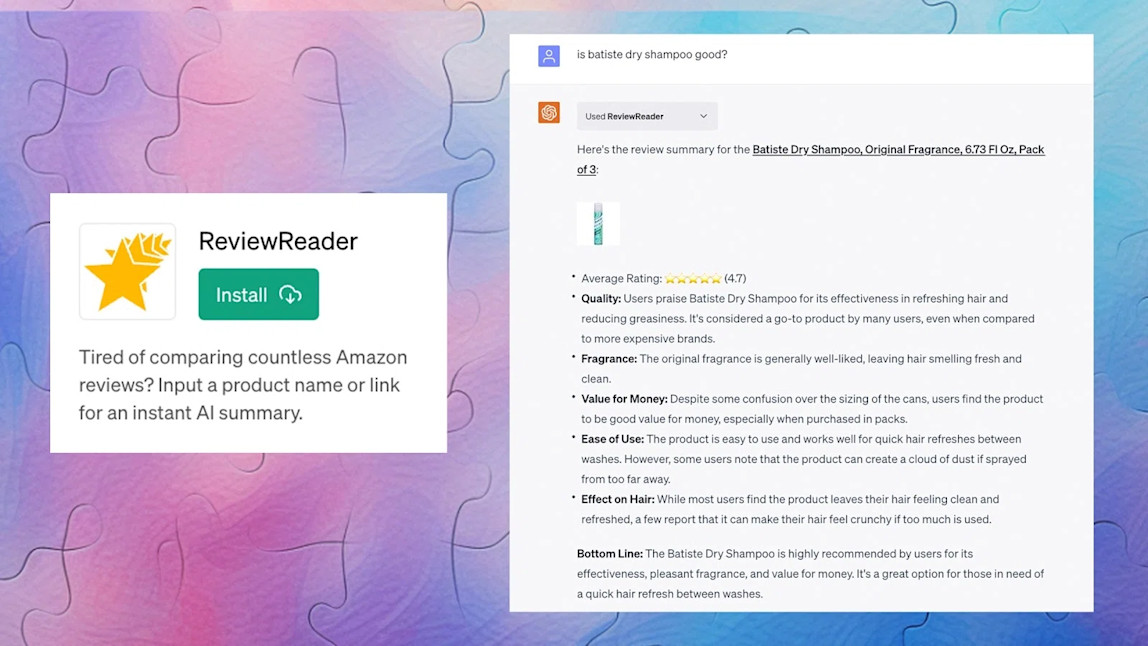
ReviewReader: Not revolutionary, but quick quality assurance
A straightforward Amazon review summarizer. Adequately does its job in giving you a fast take of hundreds of reviews. What it’s for: Reading review summaries.
Bottom line: This app shines in not only summarizing Amazon reviews, but also outlining qualities products should measure against. When summarizing multiple products, it lays out pros and cons clearly as well.
Why download? You’re not particularly picky or agonizing over an everyday item, and you simply want some quality assurance before you hit “Buy Now.”
Better than Google? For most products, yes. For detailed customer stories, no.
Good for: Purchase decisions.
Not for: Pointing out red flags, detailed comparisons.
How to use: Ask about a product or enter a link. Returns a comprehensive summary of product reviews. For comparisons, it consolidates pros and cons.
Limitations: Focuses on Amazon products and reviews. No function to fetch low-rated products to avoid.
Trigger: Product questions, “reviews,” “Compare…,” “Should I buy…?”
How to add plugins to ChatGPT
Plugins are available in the beta release of GPT-4, currently only available to paid ChatGPT Plus users.
To subscribe to ChatGPT Plus, click on your username from the chat console, select “My Plan,” then purchase your plan.
To start adding plugins:
Click on your user profile and go to “Settings.”
Select the “Beta Features” tab, then turn on “Plugins.”
Start a new chat.
At the top of the chat, hover your mouse over “GPT-4” and click “Plugins.”
Click “No plugins enabled” at the top of the chat and hit “Plugin Store.”
Start browsing and installing!
How to use ChatGPT Plugins
After installing plugins, you may use up to three at a time. Every time you want to use a plugin, you either have to start a new chat to turn it on, or return to an old chat that it's already active in.
Some simple steps to use ChatGPT plugins once they’re installed:
Start a new chat.
Make sure you’re on the plugin version of GPT-4.
Click the checkbox next to your chosen plugin(s), then start chatting.
Some people get stuck here, thinking “What now?” The plugin store doesn’t have any instructions or detailed pages like a typical app store, so the best way to start using the plugin is to figure out its triggers and what it’s supposed to return.
If the brief description from the plugin store doesn’t tell you much on where to start, check its page on sites like GPTStore.ai for features, functions, and uses.
And, of course, it’ll take some test driving yourself to figure out how a new AI plugin can work for you.
Features to Consider When Choosing a ChatGPT Plugin
When creating this list, I was expecting to hit upwards of 10 plugins to recommend. After testing pretty much every shopping-related plugin, I only shortlisted four of them based on true usefulness.
Every other plugin is an idealized proof of concept — but not yet a refined tool to revolutionize shopping.
Pitfalls I encountered included returning me bed pillows when I asked for neck pillows, fetching me laptop stand deals when I asked for standing desks, and simply linking me to an Amazon search page (not even a product page, just the search results for the product I asked for!).
What’s the majority of plugin limitations? Unhelpful data sets, promotional affiliate functions, and arbitrary calls that GPT can perform alone.
When choosing a plugin, consider what value it provides that GPT alone doesn’t (hint: the answer is data.) Here are some questions to consider when new testing new plugins:
What’s the plugin trigger?
What does it return? How useful is this output to you?
Is the plugin doing something that you don’t want to do yourself?
Shopping is a subjective experience. If you enjoy the research part but dread the deal-finding part, then you only need a plugin for the final steps of your search.
Tips for AI shopping
Not only do you need the right plugins with the best data — you’ll also benefit from using best practices.
A sophisticated car only performs as well as the driver operating it.
Here are some tips to get the best shopping experience out of AI tools:
Be conversational. This is what ChatGPT is good at, answering requests in normal human language. You don’t have to have a perfect mega prompt to get the perfect mega answer. Start with your primary question, and refine from there.
Ask for questions. When you don’t know what to ask, request, “In your answer, include some questions that would be helpful for me to answer.”
Think broadly. Shopping is a broad topic that expands far beyond mere product search. Artificial intelligence can fetch you some affordable sneakers, but it can also spitball challenging gift ideas, dig up rare promo codes, scan flight deals, and more.
Combine plugins. Either in separate chats or one (up to 3 plugins at a time), create your grocery list with the Instacart plugin, then fetch an Instacart promo code with SimplyCodes. Mix and match plugins to serve your shopping journey from beginning to end.
Verdict: ChatGPT over Google?
Even when you combine the best four plugins there’s some things you’ll leave to traditional search engines: finding consumer knowledge blogs, access to the whole of the internet, investigating style trends.
But in terms of pure shopping functions, ChatGPT plugins cut through Google’s ad clutter, even with some affiliate backing.
From shopper to shopper, my best advice is to start your journey on ChatGPT if you have subscription access to plugins.
And if you’re waiting for public access, know that while plugin-supported generative AI is in its earlier, more rudimentary stages, it’s already proving to be a viable shopping assistant.
For shoppers who want to avoid the trouble of shopping altogether, ChatGPT can be a no-brainer personal shopper very soon.
For the process-obsessed shopaholics who crave a little more control, it’s just a starting point. Consumers who nerd out a little more about shopping may still prefer to start on Reddit forums or in TikTok comments, following curated Instagram pages and browsing their favorite marketplaces directly.
Using ChatGPT in daily life
Integrating AI eCommerce into our daily lives requires clarity in what we want it to do for us. The technology will evolve and the data will improve, but users will also need to grow alongside AI as digital pilots.
Online shopping and the rise of e-commerce opened up huge possibilities for both shoppers and businesses, and AI shopping is merely the next frontier.
Even with its limitations, the modern shopper should get ahead of the crowd and let ChatGPT be their personal shopping assistant with these top-notch plugins.
Eager to read more on eCommerce knowledge and shopping tips? Check out the rest of our SimplyCodes Blog!

by SimplyCodes
Author · SimplyCodes
SimplyCodes combines e-commerce expertise, data science, and insights from our 100,000+ community members to help shoppers find the best deals online. With access to real-time data on over 400,000 stores and powered by advanced AI technology, we work to make online shopping more affordable and accessible for everyone. We bring together technical innovation and community wisdom to deliver accurate, up-to-date savings opportunities across the internet.




